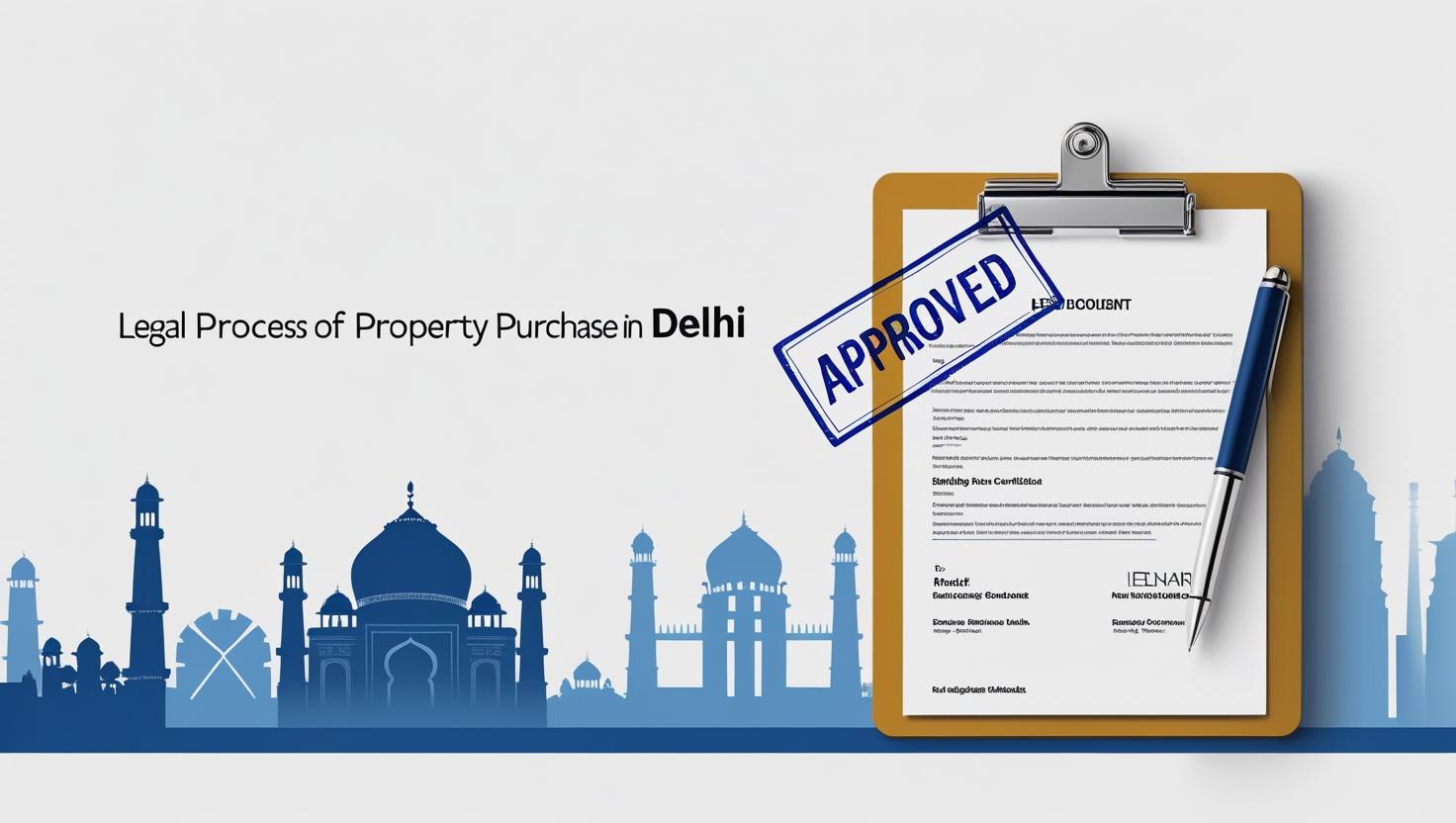Purchasing property in Delhi, a city rich in history and modernity, is a significant investment that requires meticulous planning and adherence to legal protocols. Navigating the legal landscape ensures a secure transaction and safeguards against potential disputes. This comprehensive guide outlines the Legal Process of Buying Property in Delhi, essential legal steps and considerations for acquiring property in Delhi.
1. Conducting Due Diligence
Before finalizing any property transaction, it’s imperative to perform thorough due diligence to verify the property’s legitimacy and the seller’s credentials.
- Title Verification: Ensure the seller possesses a clear and marketable title to the property. This involves examining the title deed for any encumbrances, liens, or legal disputes. Engaging a legal expert to conduct a title search can provide assurance of the property’s legal standing.
- Encumbrance Certificate: This certificate confirms that the property is free from monetary or legal liabilities. It details all registered transactions over a specified period, typically 13 to 30 years. An encumbrance-free property indicates no outstanding loans or legal disputes.
- No Objection Certificates (NOCs): Depending on the property’s nature and location, obtain NOCs from relevant authorities such as the municipal corporation, pollution control board, and fire department. These certificates affirm that there are no objections to the property’s transfer or its intended use.
2. Reviewing Property Documentation Delhi
Accurate and complete documentation is the backbone of a lawful property transaction. Key documents to scrutinize include:
- Sale Deed: This is the primary legal document evidencing the sale and transfer of property ownership from the seller to the buyer. Ensure it’s duly executed and registered with the appropriate Sub-Registrar’s office.
- Mother Deed: Also known as the parent document, it traces the property’s ownership history. It’s crucial for establishing the property’s legal lineage and identifying any past disputes.
- Approved Building Plan: Verify that the property’s construction aligns with the sanctioned building plan approved by the local municipal authority. Unauthorized constructions can lead to legal complications and potential demolition orders.
- Occupancy Certificate (OC): Issued by the local municipal authority, an OC certifies that the property’s construction complies with approved plans and is suitable for occupancy. Possessing an OC is vital for properties intended for residential or commercial use.
3. Understanding Stamp Duty and Registration
Stamp duty and registration fees are mandatory charges levied by the government during property transactions.
- Stamp Duty: This tax varies based on the property’s value and location within Delhi. It’s essential to calculate the applicable stamp duty accurately to avoid legal issues. Payment of stamp duty is a prerequisite for property registration.
- Registration Fee: Typically, this fee is a percentage of the property’s value and is paid to register the property in the buyer’s name. In Delhi, the registration fee is 1% of the total value of the conveyance deed, plus a nominal pasting charge.
Source : Delhi Revenue Department
4. Compliance with the Real Estate (Regulation and Development) Act (RERA)
RERA aims to protect property buyers and ensure transparency in real estate transactions.
- RERA Registration: Verify that the property, especially if it’s part of a new development, is registered under RERA. This registration ensures that the builder adheres to promised specifications and timelines.
- Builder’s Track Record: Assess the developer’s credibility by reviewing past projects, delivery timelines, and customer feedback. A reputable builder minimizes the risk of delays and substandard construction.
5. Financial and Tax Considerations
Understanding the financial implications and tax liabilities is crucial for a smooth property acquisition.
- Tax Clearance: Ensure that the seller has cleared all property taxes up to the date of sale. Unpaid taxes can become the buyer’s liability post-purchase.
- Capital Gains Tax: Be aware of the capital gains tax implications on property transactions. Consulting a tax advisor can provide clarity on potential tax liabilities and benefits.
6. Physical Inspection and Survey
A physical inspection ensures that the property’s actual condition aligns with legal descriptions and buyer expectations.
- Site Visit: Conduct a thorough inspection to assess the property’s condition, verify boundaries, and ensure there are no encroachments.
- Survey Report: Obtain a professional survey report detailing the property’s dimensions and any discrepancies with official records.
7. Execution of Sale Agreement
The sale agreement outlines the terms and conditions agreed upon by both parties before the final sale.
- Drafting the Agreement: This document should detail the sale price, payment schedule, property description, and responsibilities of both parties. It’s advisable to have it drafted or reviewed by a legal professional.
- Earnest Money Deposit: Typically, a percentage of the sale price is paid as an advance, signaling the buyer’s intent. Ensure the agreement specifies the terms related to this deposit.
8. Final Registration and Possession
The culmination of the property buying process involves legal registration and taking possession.
- Document Registration: Present all necessary documents, including the duly signed sale deed, at the Sub-Registrar’s office for registration. Both parties should be present, along with witnesses, to complete this process.
- Possession Certificate: After registration, obtain a possession certificate from the seller, marking the official transfer of property ownership.
9. Post-Purchase Considerations
After acquiring the property, certain steps ensure continued compliance and safeguard ownership.
- Mutation of Property: Update the municipal records to reflect the new ownership. This process, known as mutation, ensures property tax records are in the buyer’s name.
- Utility Transfers: Transfer utilities such as electricity, water, and gas connections to your name to avoid future disputes.
10. Seeking Professional Assistance
Engaging professionals can streamline the property buying process and mitigate risks.
- Legal Advisors: A property lawyer can guide you through legal intricacies, ensuring all documentation is in order.
- Financial Consultants: They can assist in understanding tax implications, loan options, and financial planning related to the property purchase.
Conclusion
Purchasing property in Delhi is a multifaceted process that intertwines legal, financial, and practical considerations. Adhering to this legal checklist ensures that buyers navigate the complexities effectively, leading to a secure and rewarding investment. Engaging professionals, conducting thorough due diligence, and understanding legal obligations are pivotal steps in this journey.


